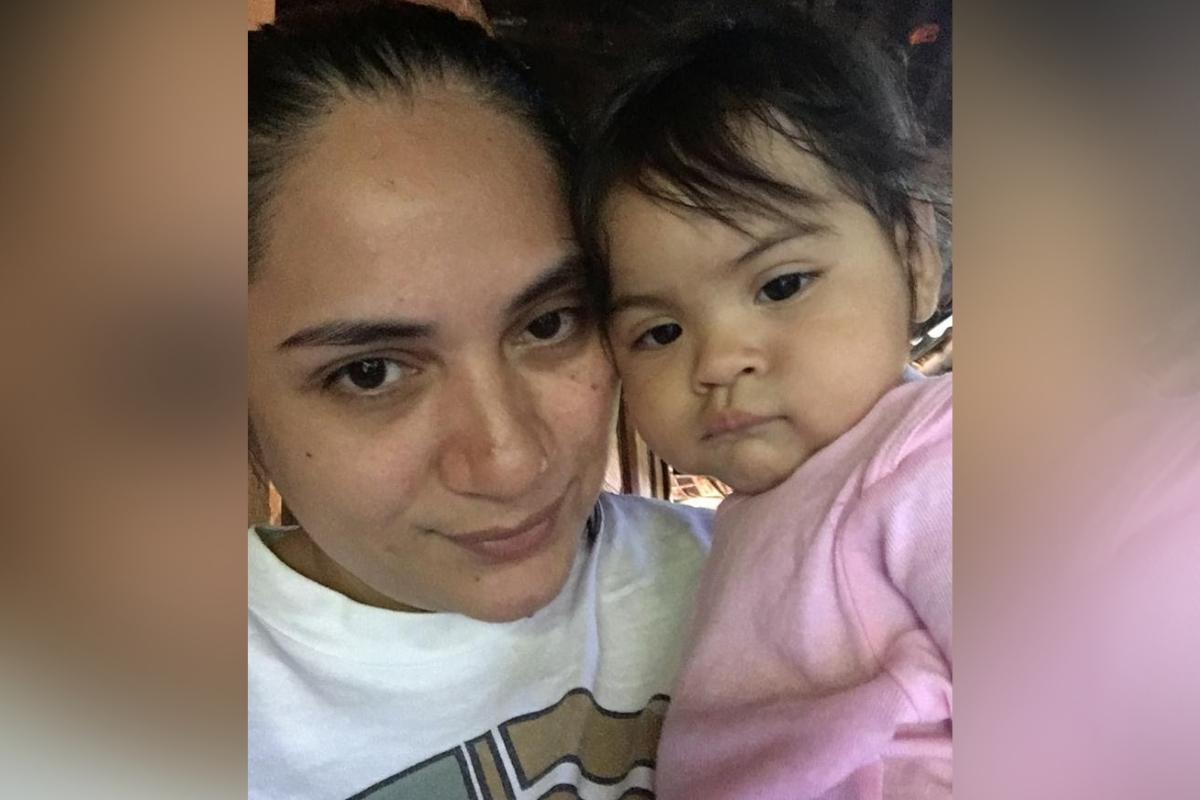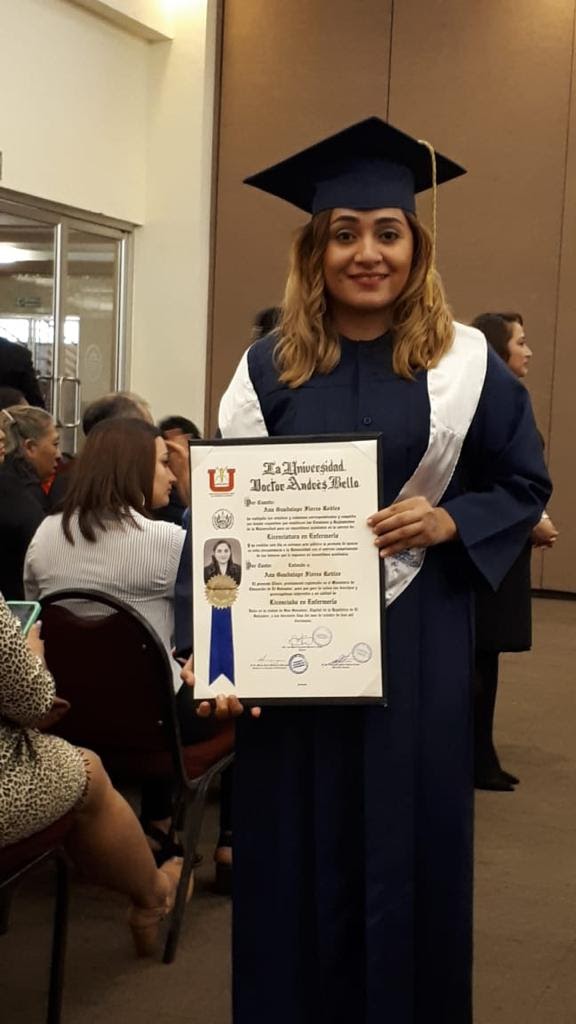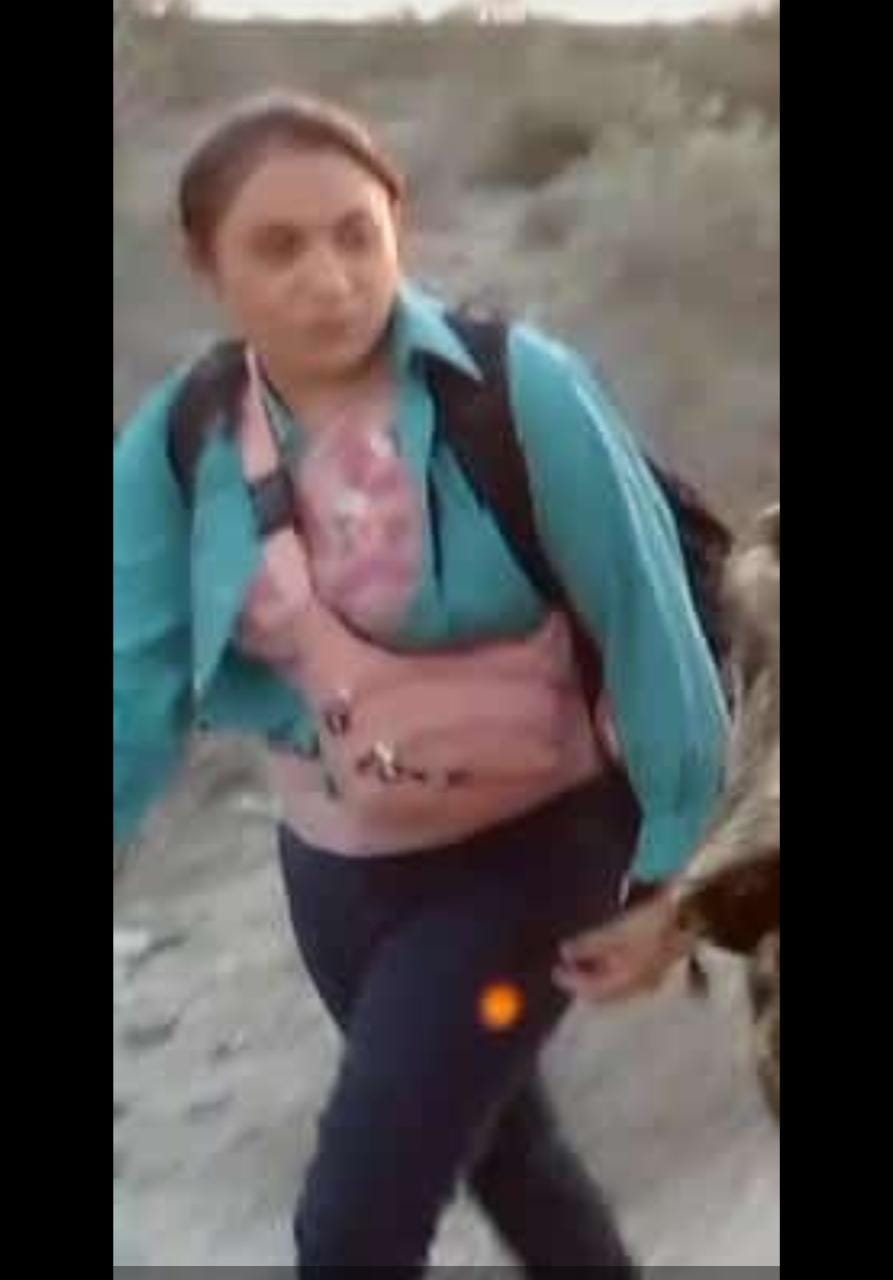

Ana Guadalupe Robles, a 29-year-old Salvadoran woman who disappeared after crossing the Texas-Mexico border, pictured here with her daughter in El Salvador. (Courtesy of the Robles family)
On May 19, Ana Guadalupe Robles left El Platanar, her little hometown in El Salvador, with the goal of making it to the United States by crossing the Texas border with the help of human smugglers known as “coyotes”—in Spanish, “polleros.”
Almost a month later, on June 13, Gilma Hernández, a friend who was waiting for Ana in Massachusetts, received a photo. In it, Ana is laying on the dry, dusty ground out in the desert. She appears to be dead. The man who sent the picture said Ana had succumbed to a cocktail of energy drinks and stimulants, a mix migrants are often forced to take to stay awake, fueled, and nimble while moving across the ruthless terrain.
Her family in El Platanar received the same picture on their cell phones and, a couple of days later, threatening messages from persons who identified themselves as cartel members and claimed that Ana was alive. They asked for as much as $10,000 for Ana’s release, but the family couldn’t afford it.
Other groups have tried to extort the family since, promising they will get her out of a detention center. The family has no record or knowledge that Ana has been in custody. They have no news from her at all.


Courtesy of the Robles family
Ana, 29, was a graduate nurse and single mom to a two-year-old daughter she had with a Salvadoran man who was already living in the United States when they met in El Platanar. But she was having difficulties finding steady work and feeling unsatisfied with the few temporary jobs she found giving COVID-19 vaccine shots.
Necessity, the force behind many migrants’ journeys, propelled Ana’s immigrant journey. She decided to make the 1400-mile journey to the United States in pursuit of better opportunities to support her daughter and her mother.
“Her dream was to help me, that’s why she said she was leaving,” Ana María Robles, Ana’s mom, told Latino Rebels.
“Me voy a ir mami, para ayudarte” —I’m going, mami, to help you— she recalls her daughter saying. “I asked her not to do it. I’ve always had my children close to me. I’ve been mother and father to them.”
Ana reported daily to her loved ones in El Salvador. On June 10, she told them that she would call again in three days, to let them know that she had made it safely into the United States.
Instead of a call, however, her family and friend received the photo from a man they didn’t know and who identified himself as part of Ana’s migrant group.
“You will find her body at 277 of Crystal City Highway,” the man texted. “Go pick her up.”
Yanira González, coordinator of family programs at the nonprofit organization Hispanics Against Child Abuse & Neglect, known as HACAN, has been helping Ana’s family to contact the authorities of the Texas Border Patrol and El Salvador embassy, to find out exactly what happened with the Salvadoran nurse. She told Latino Rebels that Hernández drove all the way from Massachusetts to San Antonio right after getting the picture and the location, but didn’t find the body.
“She asked around, shared flyers with Ana’s picture in the area, but had to stop looking amid death threats,” González said. “Criminal groups argued she was poking around too much in private territory.”
As reported by NBC News, there has been an increase in criminal groups targeting families searching for their relatives who disappeared along the border while migrating to the United States. The goal of such criminals is to profit from a family’s pain and desperation in finding their relatives.
The scammers’ modus operandi is collecting photos and data through the information shared by family members on the streets or on social media in trying to locate their loved one. They contact them with fabricated proof of life asking for thousands of dollars “for ransoms that will never occur,” NBC News states.
“Migrant kidnappings occur daily in the Mexican part (of the border), and disappearances have grown to proportions never seen in the past,” reads the article.


Photo taken of Ana Guadalupe Robles as she traveled with a migrant group (Courtesy of the Robles family)
The NBC News investigation described the dynamic of several Facebook groups where families of missing migrants leave messages asking for any clue about their relatives. Most of the messages advise people to remove their personal information, like phone numbers, and warn families about the scammers. Other messages are announcements of “found alive,” which can lead other families into thinking their relatives might be found too.
The report tells the story of the Palate family, who hurried to follow the instructions given by criminal groups saying they had their missing migrant relative. Rocío Palate made five payments of $1,000 to different Mexican accounts. She then destroyed all the pay stubs, as the criminals had instructed her to do.
“No one confirmed the payment, and there were no more phone conversations,” the article reads. The Palates never heard from José Luis Palate, their missing migrant relative.
Not only was Ana’s friend unable to find her body, the supposed proof of life that the scammers sent via snapshots on Facebook Messenger confused the family about her fate. The Robleses haven’t sent any money, but they still don’t know if Ana is dead.
“In the picture where she lays on the ground, sent by the man who said he was traveling with her, that is indeed her,” Alex Herrera, Ana’s brother-in-law, said. “But she doesn’t look dead. She seems passed out.”
Herrera, who works as a mechanic in a factory that makes sacks, explains that she might have fainted due to the drugs the polleros supposedly gave her. He doubts that Ana would have taken those, since she was a nurse and knew that could hurt her.
“The Border Patrol or her friend who drove to the location didn’t find her body,” Herrera said. “There is hope that she is alive.”
Herrera adds: “There are many things that don’t match. Other women traveling with her made it safely to the other side of the river. Why wouldn’t she? So far our anguish continues.”
Ana María said that one of the last times she was in contact with her daughter, Ana called from Piedras Negras, just on the other side of Mexico’s border with Texas, saying she was about to cross. She said Ana never mentioned any pills.
“Why would she drink that? She knows a lot about medicine,” the mother said.
About the snapshots she received from the criminals, showing a woman muzzled, on her knees and hands tied, with a sign dated June 15th and the words “help me,” Ana María said that woman was not Ana.
“You can see the face and the body. That wasn’t her. I know my daughter,” the mother said without hesitation.
Yanira González told Latino Rebels that Gilma Hernández keeps doing whatever is at her reach to find Ana, despite the death threats she received in San Antonio.


Courtesy of the Robles family
“She called me crying on August 10, saying it’s been two months since she last knew about Ana,” Gonzalez said. “They have known each other since Ana was a little girl, she says she can’t take it anymore.”
At the Texas border, Sheriff Oscar Carrillo told Telemundo Investiga that there has been a notable increase of missing and dead migrants in his jurisdiction, as well as an increase of cartels trying to take money from the families.
According to U.S. Customs and Border Protection, in 2019, searches and rescues of migrants at the border jumped from 4,920 to 12,833 in 2021, after the pandemic. Deaths have increased too, with 557 bodies found in 2021, almost twice as many as in 2019.
González said the situation of immigrants being left to die on the border affects all Latinos. “Our people are left abandoned,” she said. “The families get no support from the authorities.”
***
Juan de Dios Sánchez Jurado is a summer correspondent for Futuro Media. A writer, lawyer, and journalist from Colombia, he is currently studying at the Craig Newmark Graduate School of Journalism at the City University of New York. Twitter: @diosexmaquina



[…] post Family Still Searching for Salvadoran Mother Who Disappeared at Texas Border appeared first on Latino […]
[…] to this article Family Still Searching for Salvadoran Mother Who Disappeared at Texas Border – Latino Rebels Latino […]